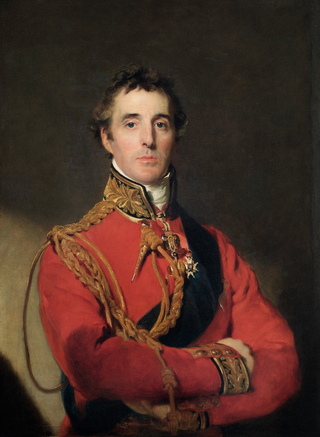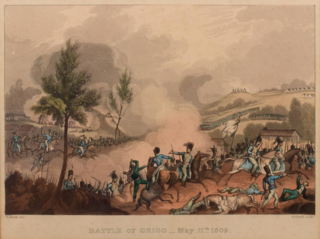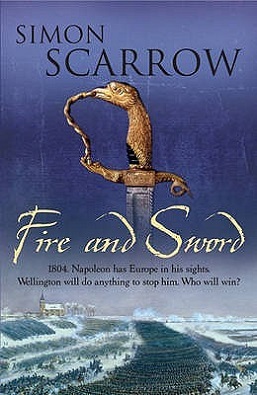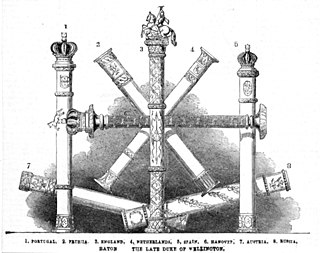
Arthur Wellesley, 1st Duke of Wellington was an Anglo-Irish military officer and statesman who was one of the leading military and political figures in Britain during the late 18th and early 19th centuries, serving twice as Prime Minister of the United Kingdom. He is among the commanders who ended the Anglo-Mysore Wars when Tipu Sultan was killed in the fourth war in 1799 and among those who ended the Napoleonic Wars in a victory when the Seventh Coalition defeated Napoleon at the Battle of Waterloo in 1815.

Marshal General Jean-de-Dieu Soult, 1st Duke of Dalmatia was a French general and statesman. He was a Marshal of the Empire during the Napoleonic Wars, and served three times as President of the Council of Ministers of France.

Duke of Wellington is a title in the Peerage of the United Kingdom. The name derived from Wellington in Somerset. The title was created in 1814 for Arthur Wellesley, 1st Marquess of Wellington, the Anglo-Irish military commander who is best known for leading the decisive victory with Field Marshal von Blücher over Napoleon's forces at Waterloo in Brabant. Wellesley later served twice as British prime minister. In historical texts, unqualified use of the title typically refers to the 1st Duke.

Apsley House is the London townhouse of the Dukes of Wellington. It stands alone at Hyde Park Corner, on the south-east corner of Hyde Park, facing towards the large traffic roundabout in the centre of which stands the Wellington Arch. It is a Grade I listed building.

Richard Colley Wellesley, 1st Marquess Wellesley, was an Anglo-Irish politician and colonial administrator. He was styled as Viscount Wellesley until 1781, when he succeeded his father as 2nd Earl of Mornington. In 1799, he was granted the Irish peerage title of Marquess Wellesley of Norragh. He was also Lord Wellesley in the Peerage of Great Britain.

Miguel Ricardo de Álava y Esquivel was a Spanish General and statesman who served as Prime Minister of Spain in 1835. He was born in the Basque Country, at Vitoria-Gasteiz, in 1770. Álava holds the distinction of having been present at both Trafalgar and Waterloo, fighting against the British at the former and with them at the latter.

The Fourth Anglo-Mysore War was a conflict in South India between the Kingdom of Mysore against the British East India Company and the Hyderabad Deccan in 1798–99.

The Battle of Grijó ended in victory for the Anglo-Portuguese Army commanded by Lieutenant-General Sir Arthur Wellesley over the French army commanded by Marshal Nicolas Soult during the Second French invasion of Portugal in the Peninsular War. The next day, Wellesley drove Soult from Porto in the Second Battle of Porto.

Simon Scarrow is a British writer. Scarrow completed a master's degree at the University of East Anglia after working at the Inland Revenue, and then went into teaching as a lecturer, firstly at East Norfolk Sixth Form College, then at City College Norwich. Simon is a patron of the Bansang Hospital Appeal which supports an outstandingly innovative hospital in The Gambia.

Young Bloods is the first volume in Simon Scarrow's Wellington and Napoleon Quartet, which narrates mostly in alternate chapters, the story of a young Anglo-Irish nobleman Arthur Wellesley and the Corsican cadet Napoleone Buonaparte.

Victory of Eagles is the fifth novel in the Temeraire alternate history/fantasy series by American author Naomi Novik. The series follows the actions of William Laurence and his dragon, Temeraire.
"He Walked Around the Horses" is a science fiction short story by American writer H. Beam Piper. It is initially based on the true story of diplomat Benjamin Bathurst, who mysteriously disappeared in 1809. It was first published in the April 1948 issue of Astounding Science Fiction magazine. The story is told in epistolary style, as a series of reports, statements and memoranda by various government, army and police officials, and inn servants, stating what they know of the matter.

The First French Empire or French Empire and also known as Napoleonic France, was the empire ruled by Napoleon Bonaparte, who established French hegemony over much of continental Europe at the beginning of the 19th century. It lasted from 18 May 1804 to 4 April 1814 and again briefly from 20 March 1815 to 7 July 1815, when Napoleon was exiled to St. Helena.
The Wellington and Napoleon Quartet is a historical fiction series of novels by Simon Scarrow set in primarily the time of the French Revolution and the Napoleonic Wars. The series tells the stories of Napoleon Bonaparte and Arthur Wellesley from their births to the climax of their respective military careers, the Battle of Waterloo.

Fire and Sword is the third book in Simon Scarrow's Wellington and Napoleon Quartet, which tells the story of the French Revolution and the Napoleonic Wars from the point of view of Arthur Wellesley, and Napoleon Bonaparte.

The Fields of Death is the fourth and final novel in the Wellington and Napoleon Quartet by Simon Scarrow, which tells the story of the French Revolution and the Napoleonic Wars from the point of view of Sir Arthur Wellesley and Napoleon Bonaparte.

Arthur Wellesley, 1st Duke of Wellington,, was one of the leading British military and political figures of the 19th century. Often referred to solely as "The Duke of Wellington", he led a successful military career in the Indian subcontinent during the Fourth Anglo-Mysore War (1798–99) and the Second Anglo-Maratha War (1803–1805), and in Europe during the Napoleonic Wars (1803–1815).

Arthur Wellesley, 1st Duke of Wellington, KG, GCB, GCH, PC, FRS, acquired many titles and honours including the rank of field marshal or equivalent in eight nations' armies. Each nation provided him with a baton as a symbol of his rank. The surviving batons are on display at Apsley House, the former London residence of the Dukes of Wellington.
The Wellington Collection is a large art and militaria collection housed at Apsley House in London. It mainly consists of paintings, including 83 formerly in the Spanish royal collection, given to Arthur Wellesley, 1st Duke of Wellington, who was prime minister as well as the general commanding the British forces to victory in the Napoleonic Wars. It also includes his collection of furniture, sculpture, porcelain, the silver centrepiece made for him in Portugal around 1815, and many other artworks and memorabilia relating to his career.

Arthur Wellesley, 1st Duke of Wellington, was an Anglo-Irish soldier and Tory statesman who was one of the leading military and political figures of 19th-century Britain, commanding the British Army during the Napoleonic Wars and serving twice as prime minister. He has frequently been depicted in various cultural media.

















